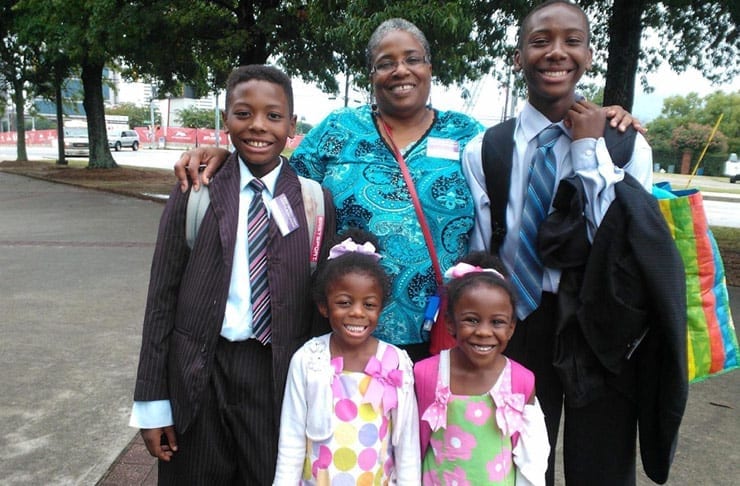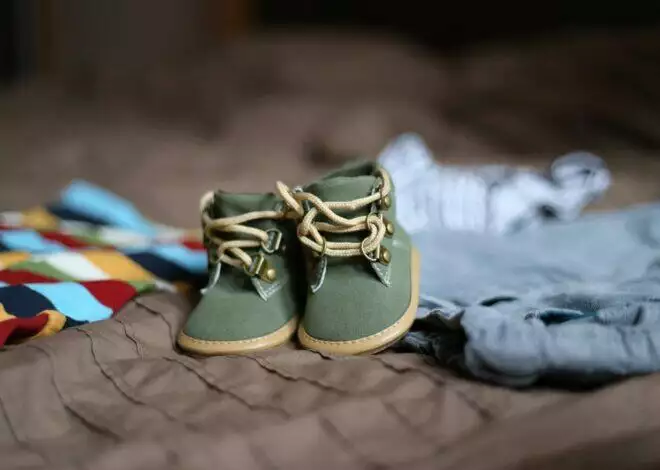For this series, MOMS DO THE MOST AMAZING THINGS, I’ve interviewed celebrities, TV personalities, and New York Times bestselling authors, but I know from personal experience that the extraordinary often goes unrecognized in “ordinary” people. Not on camera. Not with a million followers on Instagram. Not on anyone’s most influential list. I’ve met many of them in my work with Autism Spectrum Disorder (ASD) families. My foundation, Myles-A-Part, offers a holiday program for single parents raising children with autism, and I’ve seen the extraordinary in so many of them too many times to count.
A few years ago, one single parent’s story in particular grabbed my heart and blew my mind. Three of Jane Arnold’s four children, ages 15, 11 and a set of 5-year-old twins, have autism. There’s also ADHD, bipolar disorder, severe anxiety and depression in the mix. None of the children are biologically hers.
I’ve heard people talk about foster and adoptive parents rescuing children from difficult circumstances, but Jane knew these children were in an abusive situation because they were her family. The two older boys are Jane’s nephews. The two younger twin girls, her nieces. Jane called social services when she noticed that one of the boys had been badly beaten, with about 40 deep cuts that had gone untended. At one point, the twin girls were left in a car in a parking garage. Police estimated the temperature inside the car was 135 degrees. Jane wept at their hospital beds. The father and mother, Jane’s younger sister, were arrested, but the journey was just beginning.
Jane lived in fear when the father came to the house, beating on the door and demanding custody. She and the children went into hiding until they had secured a protective order keeping the father away. After years in court, the parents’ rights were terminated, and Jane won custody. In other words, Jane has gone into battle for these children when no one else stood to fight.
Jane did not know at the time how this one act of character and courage would irreversibly alter her own life. The hope was that once the children were removed from the abusive household, they would all remain together as a family unit. And that’s where Jane’s commitment to these children was tested.
As we close out April, Autism Awareness month, I hope Jane’s story; her mettle and fortitude encourage you as much as they have me.
TD: What compelled you to take the dramatic actions you took to help these kids?
Jane: I could not stand to see them in pain, and feeling unloved, devalued and worthless. Others simply turned their heads to the pain and did not want to rock the boat or take the challenge of raising these kids. My parents were foster parents. This helped me make my decision to keep the siblings together. I saw first-hand the joy and emotional stability that the kids had by being together. They had a sense of family and belonging.
TD: Raising four children, all with special needs, has to be challenging. What keeps you encouraged when things ever get overwhelming?
Jane: My religious beliefs, spiritual family, relatives and friends that give me an encouraging word or deed at the right time. The Bible promises that soon God will remove every disease and disability that plagues both young and old. That day “no resident will say: I am sick.” – Isaiah 33:24. I concentrate on these positive promises to stay encouraged. The love and hugs that I receive from the children also help.
TD: I’m sure you had a picture of what it would be like taking on guardianship of these kids. What did you NOT anticipate?
Jane: I did not anticipate how hard it would be to keep the peace, the children under control and the house neat and clean! The children can be excessive in their behaviors. They are loud, they talk all the time. They fight often with each other, interrupt each other and me. Because they lack good social skills, when they play games, it usually ends in a fight. They are endless in their activities. The only time they are peaceful is when they are asleep. I also did not anticipate how hard it would be to find the right educational setting for the children. I keep looking!
TD: How have you had to adjust your expectations along the way?
Jane: I’ve learned to accept what each child can give, not what I want.
TD: How do you define success as a parent?
Jane: When I see one of them displaying something we have been working on, for example love, kindness, understanding or playing and sharing with each other without fighting or name calling, this is success.
TD: Whenever I’ve experienced difficult circumstances, they not only did something to me, but for me. Even though they were hard, they changed me for the good. What has this journey done for you?
Jane: It made me a more forgiving person and more tolerant of others’ differences.
TD: What are your hopes for your kids?
Jane: My hopes for the children are that they grow up to be well-adjusted, spiritual- minded adults that give to others, and aren’t just takers.
*Note: There are many things we cannot share about the children’s circumstances because Jane is still embroiled in legal battles connected to the parents. But we can tell you her oldest nephew has gone from failing, to being inducted into the National Honor Society and National Beta Club. Her second nephew, age 11, is extremely bright. He and his brother take piano lessons. The twins scored the highest on the pre-kindergarten test at their school for kindergarten readiness. They’re learning to swim. They are all safe and thriving together!





